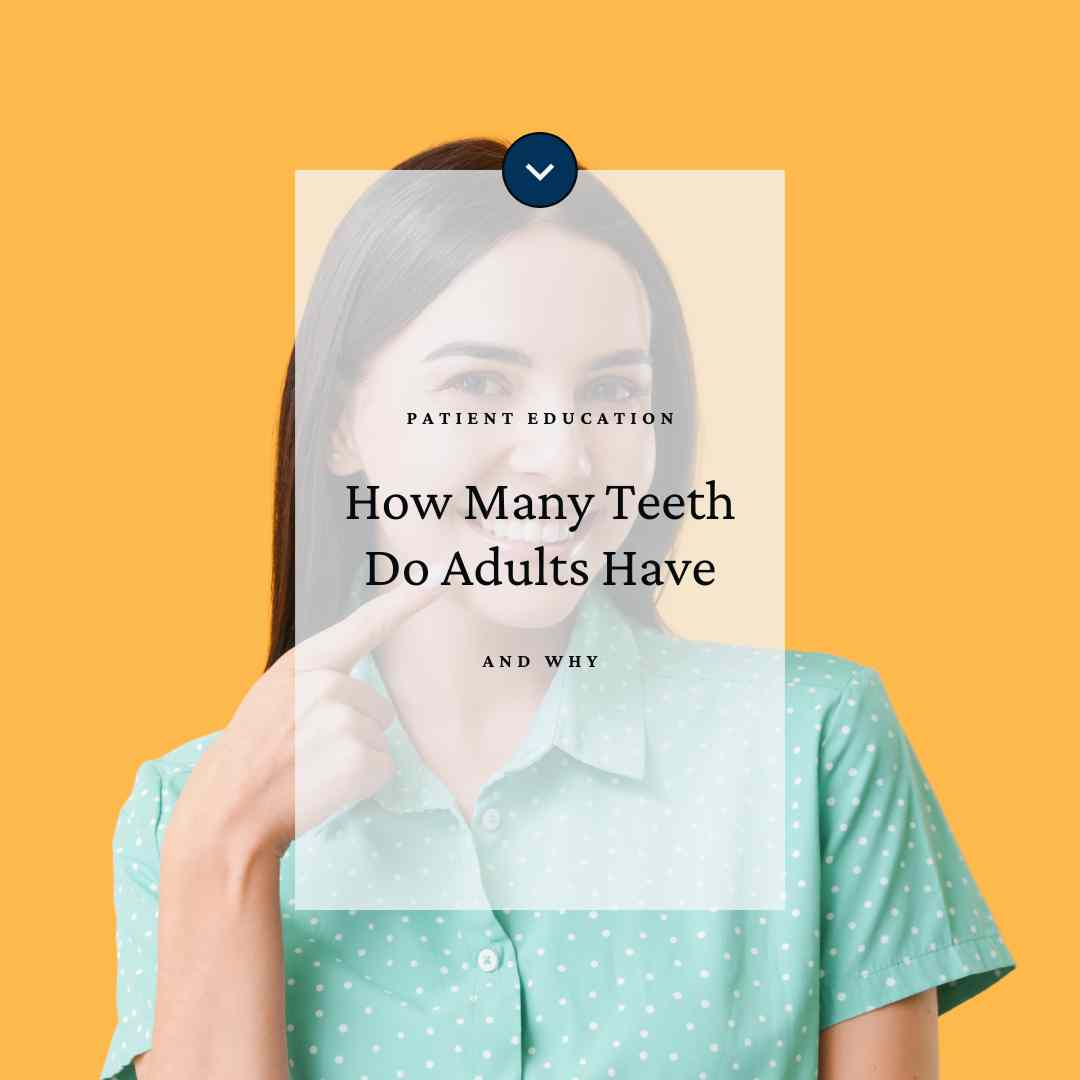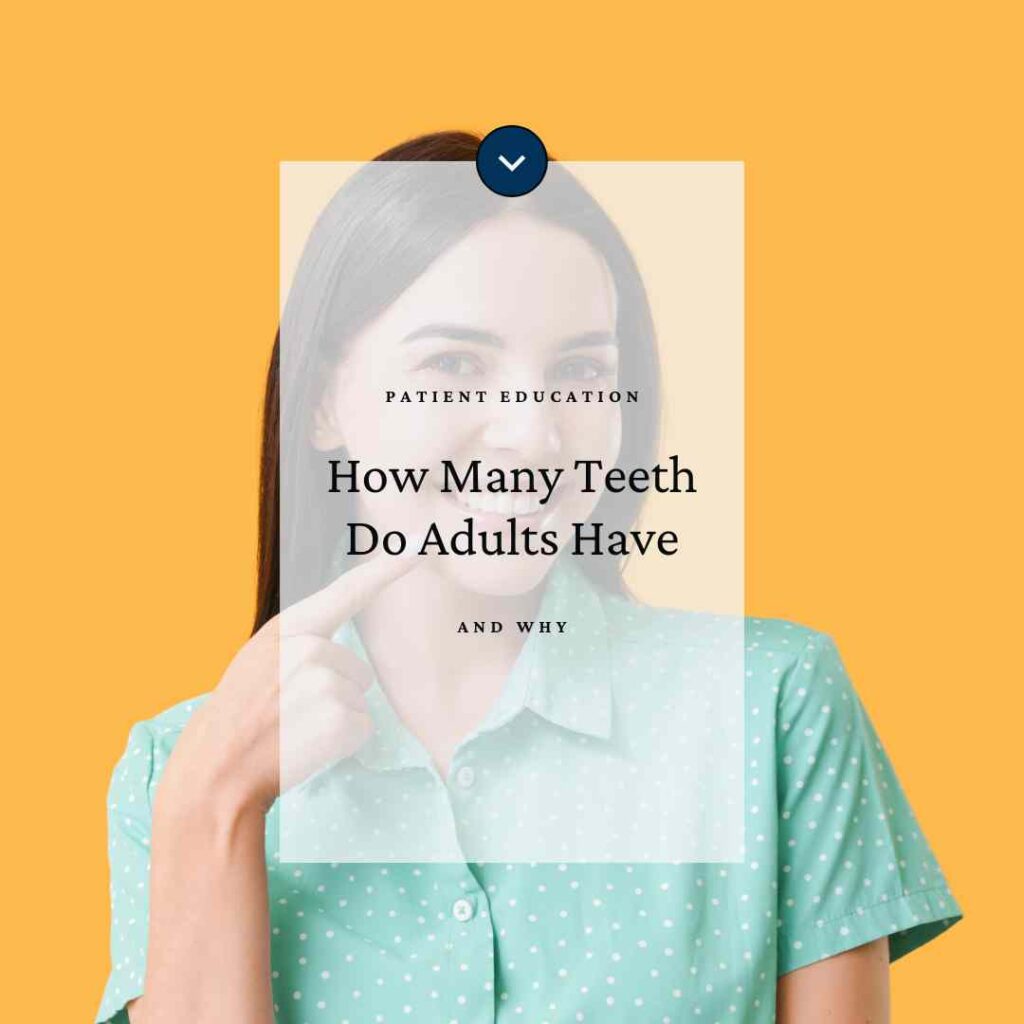How Many Teeth Do Adults Have and Why?


Have you ever wondered, “How many teeth do adults have?” It's a question that might pop into your head during a routine dental checkup or while flossing before bed. Understanding our dental anatomy has an impact on our overall health and well-being. After all, our teeth play a crucial role in our daily lives, from enjoying our favorite foods to flashing a confident smile.
Most adults have 32 teeth, but the journey to get there is quite fascinating. This article will explore the transition from baby teeth to adult teeth, shedding light on why humans have this specific number of teeth. We'll also dive into the importance of maintaining healthy teeth and provide practical tips to keep your pearly whites in top shape. Whether you're curious about your own dental health or just want to learn more about human anatomy, this guide will give you something to smile about.
Table of Contents
The Journey from Baby Teeth to Adult Teeth
The development of human teeth is a fascinating process that begins before birth and continues into early adulthood. This journey involves three distinct stages: primary dentition, mixed dentition, and permanent dentition.
Primary Dentition
The formation of primary teeth, also known as baby teeth or deciduous teeth, starts in the womb. At about 5 weeks of gestation, the first buds of these teeth begin to develop in the baby's jaws [1]. By birth, a baby has all 20 primary teeth (10 in the upper jaw and 10 in the lower jaw) hidden beneath the gums [1].
Primary teeth typically start to emerge between 4 and 10 months of age [2]. The eruption process usually follows a specific pattern:
- Lower central incisors (6-10 months)
- Upper central incisors (8-12 months)
- Upper lateral incisors (9-13 months)
- Lower lateral incisors (10-16 months)
- First molars (13-19 months)
- Canines (16-23 months)
- Second molars (23-33 months) [3]
Mixed Dentition
The mixed dentition stage begins around age 6 when the first permanent molar appears behind the primary teeth [4]. During this phase, which lasts until about age 12, children have a combination of primary and permanent teeth [4].
The process of losing primary teeth and gaining permanent ones is gradual. Primary teeth become loose and fall out to make way for the emerging permanent teeth [1]. The order of tooth loss generally mirrors the eruption pattern of the primary teeth [3].
Permanent Dentition
The permanent dentition phase starts when the last primary tooth is lost, usually around age 11 or 12, and continues throughout life [5]. By about age 21, most people have a full set of 32 permanent teeth [1].
Permanent teeth emerge in a specific sequence:
- First molars (around age 6)
- Incisors (ages 6-9)
- Canines and premolars (ages 9-12)
- Second molars (ages 11-13)
- Third molars or wisdom teeth (ages 17-21, if they develop) [6]
This gradual transition allows for proper jaw growth and alignment of the permanent teeth. It's important to note that the timing of tooth development can vary among individuals, influenced by factors such as genetics and nutrition [6].
Why Adults Have 32 Teeth
Evolutionary Perspective
The human dentition of 32 teeth has evolved over millions of years to suit our omnivorous diet and lifestyle. This dental formula consists of 8 incisors, 4 canines, 8 premolars, and 12 molars [7]. This configuration has developed to facilitate efficient chewing and food processing, aligning with the dietary needs of humans as omnivorous primates [7].
The evolution of human teeth has been closely tied to changes in jaw morphology and food processing techniques. These adaptations have played a crucial role in human evolution, contributing to encephalization (brain growth) and the development of speech [7]. As the jaw changed size and muscles weakened, it created more space for brain growth while also enabling the ability to speak [7].
Functional Necessity
Each type of tooth serves a specific purpose in the human mouth. Incisors are used for biting and cutting food, canines for tearing, premolars for crushing, and molars for grinding [8]. This diverse set of teeth allows humans to process a wide variety of foods efficiently.
The distribution of teeth in the mouth is as follows:
- Four central incisors (front teeth)
- Four lateral incisors (side front teeth)
- Four canines
- Eight premolars
- Four first molars (back teeth)
- Four second molars (back teeth)
- Four third molars (wisdom teeth) [9]
Jaw Development
The development of 32 teeth is closely related to jaw growth and facial development. During adolescence, the jaws grow forward, with the mandible (lower jaw) typically growing more than the maxilla (upper jaw) [10]. This growth pattern is more pronounced in males [10].
However, not everyone's mouth can accommodate all 32 teeth comfortably. In some cases, the eruption of wisdom teeth can lead to problems such as misalignment, increased decay risk, impaction, or periodontal disease [9]. As a result, many people opt for wisdom teeth removal to prevent these issues [9].
Maintaining Healthy Adult Teeth
Proper Oral Hygiene
Maintaining healthy adult teeth requires a lifetime of care and attention. The foundation of good oral health lies in proper daily hygiene practices. Brushing teeth twice a day with fluoride toothpaste is crucial for removing plaque and preventing tooth decay [11]. It's particularly important to brush before bed to eliminate germs and plaque that accumulate throughout the day [11].
The technique of brushing is equally significant. Gentle, circular motions should be used to effectively remove plaque without damaging the enamel or gums [11]. Additionally, cleaning the tongue is essential for removing bacteria and preventing bad breath [11].
Flossing once a day is vital for stimulating the gums, reducing plaque, and lowering inflammation in the mouth [11]. For those who find traditional flossing challenging, alternative tools like dental flossers can be effective [11].
Regular Dental Check-ups
Regular dental check-ups are essential for maintaining oral health. Dentists recommend visits every six to twelve months, depending on individual needs [12]. These appointments serve multiple purposes, including professional cleaning, examination for cavities, and screening for oral cancer [12].
During a typical dental visit, a hygienist will perform a thorough cleaning and may take X-rays to detect hidden issues [12]. The dentist will then examine the teeth, gums, and overall oral health, looking for signs of decay, gum disease, or other potential problems [12].
Diet and Lifestyle Factors
Diet plays a significant role in oral health. Limiting sugar intake is crucial, as sugar converts to acid in the mouth, eroding tooth enamel and leading to cavities [11]. The frequency of sugar consumption is particularly important, with studies showing that children consuming sugars four to five times per day were six times more likely to have a high caries rate [13].
Drinking water, especially after meals, helps wash away sticky and acidic foods, protecting teeth between brushes [11]. Consuming crunchy fruits and vegetables not only provides essential nutrients but also stimulates saliva production, which naturally cleanses the mouth [11].
Avoiding tobacco use is crucial for maintaining healthy gums and preventing oral health issues [14]. For those looking to quit smoking, numerous resources are available through various health organizations [14].
Answering the Question: How Many Teeth Do Adults Have?
The journey from baby teeth to adult dentition is a fascinating process that has an influence on our overall health and well-being. Our 32 adult teeth are the result of millions of years of evolution, each serving a unique purpose to help us chew, speak, and smile with confidence. Proper care of these teeth through good oral hygiene, regular dental check-ups, and a healthy diet is crucial to maintain their health and functionality throughout our lives.
Understanding our dental anatomy empowers us to take better care of our oral health. From brushing and flossing to making smart food choices, every action we take has an impact on the longevity of our teeth. To learn more about wisdom teeth and their role in our dental health, check out this informative blog post here. Remember, a healthy smile is not just about looking good – it's an essential part of our overall health and quality of life.
FAQs
-
1. Why do adults typically have 32 teeth?
Adults generally have 32 teeth, which comprise two complete sets of teeth over their lifetime. Initially, as infants, individuals have 20 teeth, but this number increases to 32 in adulthood. Each of these 32 teeth plays a specific role in the process of chewing and eating. Maintaining good dental hygiene and healthy gums is crucial to prevent cavities and other health issues.
-
2. Why do many adults have only 28 teeth instead of 32?
Adults usually have 28 teeth because it is common to have the four wisdom teeth removed. An adult's permanent teeth configuration typically includes eight incisors, four canines, eight premolars, and twelve molars, which count the four wisdom teeth. The removal of wisdom teeth reduces the total count to 28.
-
3. What is the purpose of having wisdom teeth?
Historically, wisdom teeth were essential for our ancestors who had a diet consisting of raw plants, hard nuts, and tough meats, which needed to be ground down for digestion. Today, due to modern cooking techniques and eating utensils, wisdom teeth have become less necessary.
-
4. What function do canine teeth serve?
Canine teeth are located at the corners of the mouth and are primarily used for ripping and tearing food. They are distinctive for having the longest root among all teeth and end in a single, sharp point, making them particularly effective for their purpose.
References
[1] – https://www.betterhealth.vic.gov.au/health/conditionsandtreatments/teeth-development-in-children
[2] – https://www.byte.com/community/resources/article/baby-teeth-to-adult-teeth
[3] – https://www.ncbi.nlm.nih.gov/books/NBK573074/
[4] – https://www.colgateprofessional.com/patient-education/developing-teeth-primary-permanent
[5] – https://en.wikipedia.org/wiki/Human_tooth_development
[6] – https://www.hopkinsmedicine.org/health/wellness-and-prevention/anatomy-and-development-of-the-mouth-and-teeth
[7] – https://www.quora.com/Why-does-a-human-have-32-teeth
[8] – https://my.clevelandclinic.org/health/body/24655-teeth
[9] – https://urbansmileschicago.com/do-we-really-have-32-teeth-here-is-the-truth-about-it/
[10] – https://www.ncbi.nlm.nih.gov/pmc/articles/PMC8033627/
[11] – https://www.healthline.com/health/dental-and-oral-health/best-practices-for-healthy-teeth
[12] – https://www.healthpartners.com/blog/dental-preventive-visit/
[13] – https://www.ncbi.nlm.nih.gov/books/NBK534248/
[14] – https://www.nidcr.nih.gov/health-info/oral-hygiene
The information available on the Website is for general health information only and is not intended to be a substitute for professional medical advice, diagnosis or treatment. You should not rely exclusively on information provided on the Website for your health needs. All specific medical questions should be presented to your own health care provider and you should seek medical advice regarding and before making any changes related to your health.
If you choose to use the information available on the Website without prior consultation with and consent of your physician, you are agreeing to accept full responsibility for your decisions and agreeing to hold harmless Randall K. McVey, DMD PA, its agents, employees, contractors, and any affiliated companies from any liability with respect to injury or illness to you or your property arising out of or connected with your use of this information.
MedicAL DISCLAIMER
Patient Portal
help
Disclaimers
HIPAA
Accessibility
Privacy Policy & Cookie Policy
Terms & Conditions